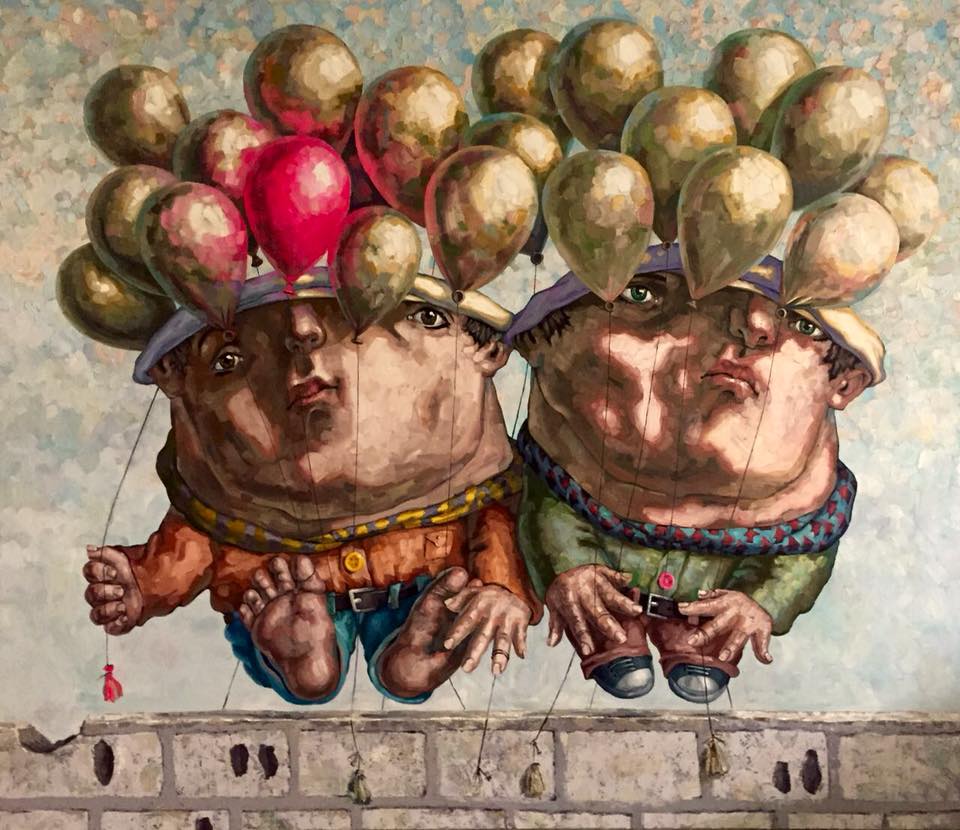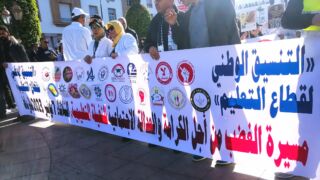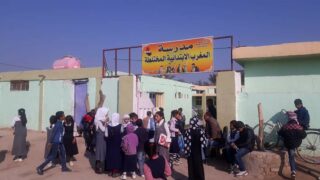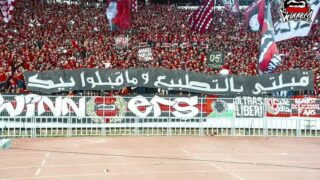
This publication has benefited from the support of the Rosa Luxemburg Foundation. This text may be reproduced in part or in full, provided the source is acknowledged.
In Morocco, not only the grown-ups are enticed to migrate, the younger ones as well have the desire to reach the opposite shores. Their numbers increase each year. They throw themselves into the sea, driven by a childish enthusiasm and a craving for adventures. They then wait at the nearest gate to either cross over or, in the best cases, stay in accommodation centers, some of which respect their humanity while others can’t manage to absorb their massive numbers. The youth end up just hanging out, awaiting the unknown.
“Oh boat…”
“Oh boat, oh my love, take me out of misery. In my country, I am despised, I am so tired and fed up.”
An entire generation of Moroccans has chanted the lyrics of the song “Oh Boat” (by the Algerian Rai singer Rida Taliani) since the beginning of the new millennium. The song has incepted the idea of the boat as a way out of misery in the collective consciousness of children. Its strong symbolism has been shaped into a mental image, as the children become accustomed to drawing a small canoe and building paper boats that represent it.
Every day, the echo of the song spreads in the popular neighborhood that starts in a“Ras Darb” (1) (where the young people hang). The lyrics express their pain; the rhythm makes their body move to dancing while the cheap hash cigarettes take them in their tripping imagination to the “promised paradise”. The children of the neighborhood watch the scene, aware of the joblessness of those young people (who are mostly university graduates) and their wild desire to “burn the border” (*Harrig ) (2). Indeed, it may seem shocking at first, and the question is raised, “how is it possible that a Bachelor degree or a Master’s degree does not allow a young man in his twenties or in his thirties to make a dignified livelihood?”.
Stories of that kind repeat themselves and boys grow up convinced that neither studying nor staying in Morocco is of any use”. Hence, they decide to take the shortcut and leave while they are young. Of course, that is not their sole motive for migrating; each minor has his own story and reasons, as the following testimonies narrate.
Testimonies and stories
• Adam (3): “The country is not important, as long as it is in Europe.”
Adam puts his hands in the pockets of his black jumpsuit while his eyes stare at his rickety shoes. Adam (16 years old) walks slowly as he wanders in the narrow streets of Al Haddad neighborhood in the district of Bani Makad in the city of Tangiers. Each week, for two years, Adam has been risking his life to cross irregularly the straits of Gibraltar, he dreams of leaving his hometown to go to Spain: “There is nothing for me to lose in my country. There, I will be hosted in an accommodation center for minors like myself, then I’ll receive residence papers and after that I will work to send my mother money.”
The "Gloomy" Economy of Morocco
15-07-2019
For him, the country does not matter as long as it is in Europe. He doesn’t have a dream or a plan in Europe and his only ambition is to help his mother who works in a textile factory and is only paid 1.20 Euros an hour. “Hell is waiting for him”, Adam tries to ignore these words and hold on to the dream of migrating to the “European paradise”. The pictures that his friends share on social media encourage him to leave. “They are happy, they wear the prettiest clothes, and they really live a beautiful life… I think they live in Sweden”. With these words, Adam express his admiration for his friends’ lifestyle, reduced into stereotypes that reinforce the parading image that immigrants like to show to their country’s people.
• Ismael: “I am migrating with my mother’s consent.”
Originating from Tangiers, Ismael (4) dropped out of school at the age of 12 to try and cross the gate of the city of Ceuta, occupied by Spain, with the consent of his mother. The boy wants to follow the footsteps of his neighbor who had obtained residence permit after touching down the “promised land” in Madrid. His ambition is to become a mechanic and buy a car and an apartment.
Every day, dozens of teenagers try to climb the fences of the harbor. They test their luck by hooking their bodies under the big boats going to the Spanish Algeciras island which is 40 minutes away.
• Marwan: “I’m immigrating at any cost.”
He sat by himself, staring at the horizon expanding over the Mar Chica lake (bordering the Mediterranean Sea) in the city of Nador. This is where 13-year-old Marwan has been settled temporarily for over 6 months. Originally from Fes, Marwan (5) speaks about his attempts to reach the European shore: “I have tried to cross to the city of Melilla many times. The first time, I climbed the fences; the second time I hid under a bus transporting passengers; other times, I tried to climb on boats’ ropes… But in the end, all my attempts have failed.” Marwan didn’t give up yet. “May you arrive safely, my son,” this is how Marwan’s mother concludes her conversations with her son. Her warm voice over the telephone destabilizes him. His mother’s blessing, in addition to the situation that afflicts him, the pictures that he sees and the stereotypes that have taken root in his imagination about the benefits he would obtain if he migrates, allcharge his small body with an energy directed towards migration at any cost, even if he has to pay for it with his own life.
In Nador… Not far from Melilla
At a distance of 14 kilometers from the city of Melilla, occupied by Spain, is the Moroccan city of Nador. It has become a resting place for those eager to “burn the border” to the opposite shore. There are many nationalities there. Some are sub-Saharans, others have come from countries devastated by wars, and many are Syrians awaiting their turn, after having become present in all Moroccan cities – such as Rabat, Casablanca, Tangiers and Agadir.
Among the Moroccans ready to migrate, the minors too, temporarily settle in the city of Nador. They live together in shared apartments, often reassembling according to the city or region they come from. Since the law forbids minors from renting, the lease is usually signed by an adult person.
“They are not homeless, they have families. They are school dropouts who want to migrate,” says Omar Al Naji (6), a lawyer and the director of the Nador office for the Moroccan Human Rights Association. He continues, “reaching the other shore happens through two ways: either by infiltrating the Beni Anssar Port, hiding inside boats, to arrive directly to Europe, or by going to Melilla where there is an accommodation center which can incorporate up to 400 persons. When the number of people exceeds this amount, they are forced to live in the streets. Their presence in Melilla allows them to reach Spain through ways which can be dangerous, such as hiding in the boats (…) As minors, they subject to international conventions for children’s rights which guarantee them education, family protection and health care which are rights largely unsecured by the Moroccan authorities. So, the minors just pass time hanging around, while a few civil society organizations or benefactors provide them with essential needs such as food and accommodation. Unfortunately, governmental institutions are absent which means the state has resigned from its duties toward them,” Al Naji concludes.
Where did they come from?
Wandering in the Abi Nasser port, we ask a random group of children hanging around uswhere they came from. It appears that they have come from different cities and regions, even from the so-called“the good Morocco”, such as Casablanca, Tangiers or the capital Rabat. Their answer is always, “I am despised in my own country and I am living in misery.”
Unemployment, crime, theft and, most importantly, the idea of migration are all social phenomena incubated inside the marginal areas of Fes, Tangiers (which is among the places where most minors who populate the 18th district of Paris come from, for example) (7) and other metropolitan cities of Morocco, especially in the marginal neighborhoods that are morphologically distorted behind the urban centers. Like a virus, the dream of migration spreads and infects the children there before the grown-ups.
Marwan lives with his father, a day laborer who works in construction or as a hawker in popular markets. His mother works in the informal market, selling bread on street corners. The eldest of his siblings, Marwan has dropped out from school because the family couldn’t afford to pay for his education anymore and his parents decided that earning money by any means was the solution to save the four other children of the family.
Moroccan minor migrants in Paris: What the numbers say (8)
• The families of 40% of the minor migrants in Paris come from villages or areas around urban agglomerations suffering from extreme poverty.
• 40% migrated after family issues such as divorce or other problems like domestic violence.
• 10% are homeless (street children).
• 10% belong to middle class families.
Immigration as a means to resolve crises
Minors mostly leave their homes because of family disintegration, conflicts, drug addictions, school drop-outand other problems related to social vulnerability, like unemployment, limited incomes and lack of basic services…
Some families convince their younger boys of the necessity to leave as a means of resolving the crises in which they find themselves plunged. “What’s the problem if I burn the borders once, twice or thrice? At least I will be like my friend, Samer, who can now help his mother and family with the income…” This is how Marwan persists in trying to get to Europe, whatever the cost may be.
What actually happened to others in their journey to Europe is not unknown to Marwan and his friends. In France for example, most of the unaccompanied minors live in the streets and resort to things like stealing and pickpocketing, fall victim to addictions to alcohol and drugs or into prostitution. They sometimes get sexually harassed and are also chased by the authorities. This “phenomenon” has become a hot topic for the media in the last few months. Marwan and others waiting at the border gates probably think that the “successes” of their friends – their showing-off, their clothes and accessories – are a consequence of their work or the aid they receive. What they fail to realize is that these acquisitions are actually the consequence of them becoming part of networks of prostitution or drug dealing.
Moroccan minors: Increasing Numbers
There are no detailed statistics on the overall number of unaccompanied Moroccan minor migrants present in the European continent.
The association “Save the Children” has reported that the proportion of this category reaches 65% of the overall number of minor migrants, and they are estimated to be over 4000 children; a number that has tripled since 2016. They are rescued by child protection organizations and put in accommodation centers in Andalusia, in the two occupied cities of Ceuta and Melilla, in Catalonia, in Madrid and, to a lesser extent, in the Bask region and in Valencia.
In Sweden, this phenomenon has surfaced since 2013 in various cities such as Stockholm and Malmo. The number of Moroccan minors there was estimated to be around 800 children in 2017. These children mostly refuse to stay in accommodation centers and instead wait for their situation to be regularized as asylum seekers or to otherwise live with a relative or a Moroccan family.
Look for the mother
The mother is by herself a thematic and a common denominator in the question of immigration. She has often been celebrated by Rai singers in the prime days of “border burning” in the nineties and the early 2000s. She impersonates the “home country” and embodies human values such as“sacrifice”.
For Marwan, sacrifice is non-negotiable. He is not doing it to save his siblings or his father but for his mother who is tuckered out by long hours of sitting in the cold streets to earn a few miserable dinars. The son says he can no longer tolerate the humiliating scene that he witnessed one morning (which probably reoccurs from time to time) when an authority official threw his mother’s merchandise on the ground while insulting her.
It is not the “bragging” of friends that pushes Marwan towards Europe; the feeling of “humiliation” alone has motivated him and made him disappointed with his home country. “Border Burning” is not only a dangerous trip on board a rubber boat, it is also a new form of expressing discontent. Moroccan people are no longer demanding their human rights in was has been called “the regional movements” of Morocco, but they are now seeking an “exit from the country”. The idea of giving up the Moroccan nationality has even become a threatused to pressurize the authorities into hearing their demands.
Marwan tries to forget everything about his country by listening to a Rai song. He imagines the emotional state of the estranged singer who describes thepainful separation from his mother. It is a separation that might be permanent. Who knows? The waves of the sea can bring about the end of his story, or it can carry himto the shores of safety.
Anattempt to mitigate
After the phenomenon of Moroccan minor migrants surfaced, it was necessary to look for solutions or to try and mitigate this scene. Accommodation centers are among the solutions that were found. The children are welcomed there in Spain, France and Germany. The role of those centers is to protect them and guarantee that basic needs are provided to them.
However, those centers themselves also witness violations of the children’s rights, especially when they become overcrowded. The human rights associations consider those to be equivalent to detention centers or minors’ prisons. Sometimes, they don’t even have a room or a bed to sleep in, which, by itself, triggers them to escape. As a result, many of the children end up on the streets.
European countries prefer to throw the ball in Morocco’s court by giving the country financial support to build local accommodation centers. But the local human rights associations refuse this solution. In the city of Nador, for instance, the Moroccan Human Rights Association (9) has demanded from the local authorities to cancel the project of building an accommodation center for minors in partnership with Spain. They argue that the State should rather work on providing this category of the population with decent living conditions, such as education, health care and family protection.
Adoption is another solution. The Spanish government is crafting a convention with Andalusia to allow Spanish families there to adopt Moroccan minors under 12 years of age, who reside in the accommodation centers of the city. The Spanish Minister of social welfare has stated that there are between 60 and 65 families in Ceuta who would like to adopt some of the Moroccan minors who are hanging around in the city’s streets. This might not be enough to shelter everyone as the number of minors below the age of 12 in the accommodation centers is estimated to be around 100 or 150. For them, the popular Moroccan expression “Tar in my country is better than honey in other people’s countries” has been transformed into “Honey in other people’s countries is far better than tar in my own.”
The content of this publication is the sole responsibility of Assafir Al-Arabi and Rosa Luxemburg Foundation cannot accept any liability for it.
Translated from Arabic by Fourate Chahal Rekaby
Published in Assafir Al-Arabi on 16/10/2018
1-A word meaning “street corner” that the young people from popular neighborhoods use to refer to a corner in the street where they meet to hang out, talk and sometimes smoke cigarettes and hash.
2-“Harrig” (border burner, someone who immigrates irregularly) is a word widely used by the Moroccan youth.
3-A testimony from the French newspaper “Le Monde” inside a report entitled “From Tangiers to Paris, on the footstep of the lost children of Morocco”.
4-A testimony from France-Press Agency (AFP) which has been published in many newspapers and on various platform, such as “L’Express” French magazine.
5-An exclusive testimony for Assafir Al-Arabi. The name has been changed.
6-Exclusive interview given to Assafir Al-Arabi.
7-According to a study conducted by the Spanish “Border Burners” association, under the supervision of María Antúnez , Álvarez Nora Driss , Cotilla Rosa ,García Rodríguez Sara Olcina Vilaplana and entitled “:De niños en peligro aniñospeligrosos: unavisiónsobre la situación actual de los menoresextranjerosno acompañados en Melilla, Mellila, 2016”.
8-Statistics issued by the Association “Masarat” as part of a study titled:“Recherche-action sur la situation des mineurs non accompagnés marocains”, Avril 2018,page 45.
9-According to what Mr. Omar Al Naji, the president of the association, has revealed to us in an exclusive interview for Assafir Al-Arabi.




